Search
Showing 10 of 1702 results for the cuzzy rolly, latest
-
Stronger together: TNZ and ENZ support school sector growth through agent famil
The week-long programme brought eight agents from mainland China, Hong Kong, and Taiwan to Wellington, Marlborough and Canterbury.
The aim was to give agents first-hand experience of New Zealand’s short-term study offerings in schools, strengthen connections with regional education providers, and explore opportunities to develop tailored study tour programmes.
The famil was funded by TNZ, with ENZ collaborating with Schools International Education Business Association of New Zealand (SIEBA) to manage the itinerary and logistics.
ENZ Senior Market Development Manager (China), Felix Ye, and TNZ Trade Development Manager (Greater China), Sandy He, led the delegation of eight agents - providing on-the-ground support and sector insights.
In the year ended December 2024 New Zealand exported $1.29 billion of education related travel to China. This represented 35.8% of all exports of education related travel. For trade in education related travel China, People's Republic of ranked 1 of 140 for highest export value. [1] According to data from Stat NZ, 7.9k Chinese students holding visitor visas came to New Zealand for short-term programmes or study tours - the majority visiting during China’s school holidays in July. [2]
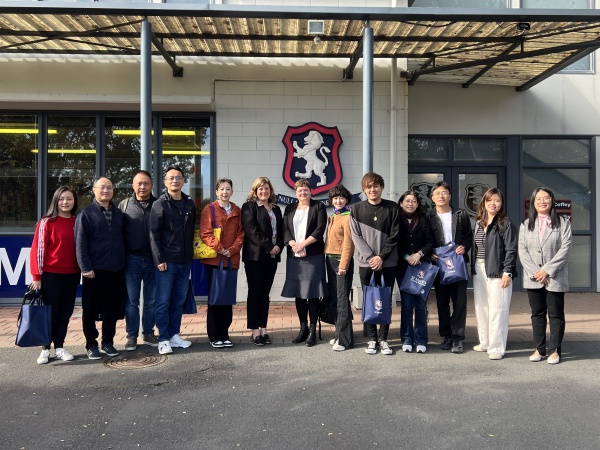
The agents visited St Mark’s School in Wellington, meeting with Erica Harrison, the Acting Principal, and her team.
The agents met with 15 schools across the three cities, including a mix of private, state-integrated, and single-sex schools. The journey began in Wellington with a warm welcome at Rāroa Normal Intermediate, where the group received a traditional mihi whakatau — a first-time experience for many.
Deputy Principal Dave Gillies said it was a great opportunity to showcase the school’s experiential learning focus.
“We’re excited about developing professional relationships with the agents and the opportunities that will grow from this visit,” he said.
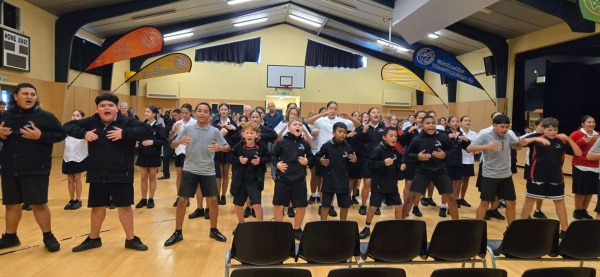
Students from Chisnallwood Intermediate School perform a haka to welcome the group to the school.
In the South Island, the group explored a range of school offerings and regional initiatives.
In Blenheim, agents gained insights into the unique characteristics of state-integrated education at Richmond View School, Marlborough Boys' College, and Marlborough Girls' College.
In Methven, Mt Hutt College showcased its tailored short-term programme, featuring sustainability-focused tourism at Ōpuke Thermal Pools and hands-on alpine and agricultural experiences – a creative integration of local resources into learning.
The famil concluded in Christchurch, where SIEBA and Christchurch Educated gave overviews of the New Zealand school system and introduced how their initiatives support the growth of international education across the sector.
ENZ Regional Director of Greater China, Dr Ron Xavier, said study tours are a growing area of interest among Chinese agents.
“This famil gave a genuine sense of what New Zealand schools can offer — from cultural experiences to hands-on learning — and helped connect agents with educators who are eager to host students,” he said.
ENZ and TNZ plan to work closely with participating partners to develop new study tours across different regions for 2026, helping raise awareness of New Zealand as an education destination for Chinese students.
SIEBA Executive Director, John van der Zwan, is looking forward to experiencing the benefits of the study tour famil.
“Study tours have significant potential, we look forward to the outcomes of this famil increasing the exposure of New Zealand’s regional schools in the China market,” he said.
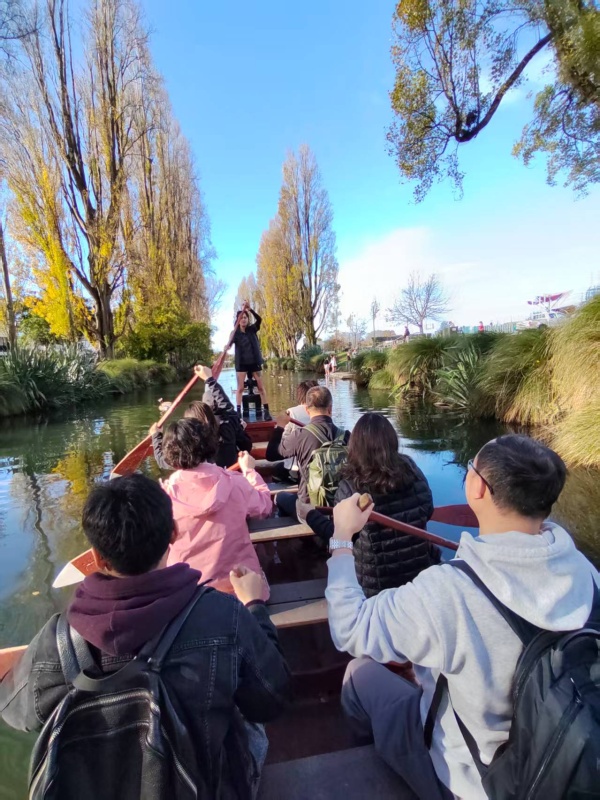
Paddling a waka on the Avon River. Beyond education, the famil also highlighted New Zealand’s unique culture and natural beauty. From visiting Te Papa and Wētā Workshop to paddling a waka on the Avon River in Ōtautahi Christchurch, agents experienced the blend of tradition and innovation that makes New Zealand a compelling destination.
[1] Tourism data | Corporate and Stats NZ
[2] https://tourismnewzealand.com/insights/tourism-data/
-
New Zealand ready to lead students to a more sustainable future
Research commissioned by Education New Zealand in May found that 79 percent of participants were interested in studying sustainability and climate change. And the 2019 QS Environmental Concerns Survey of 3700 prospective international students from around the world found that more than 75 percent would be more likely to choose a degree if the content helped them learn about reducing their environmental impact.
New Zealand is often viewed as a progressive nation delivering new solutions to problems while at the same time valuing people, place, and planet. Our world-class education system prides itself on preparing graduates with the practical skills and innovative thinking sought by future employers. Those skills must also now empower them to address issues of global consequence.
Tertiary education providers boost sustainability education options
New Zealand tertiary education providers are playing an increasingly important role in shaping this enthusiastic generation of learners, with many institutions incorporating a sustainability focus into their research and in many of the courses they offer.
Waikato University has gone one step further, announcing it will offer the world’s first Bachelor of Climate Change degree from next year. The three-year course will take a multi-disciplinary approach combining science, economic, social, and political systems, plus mātauranga Māori (Māori knowledge and wisdom).
“We all agreed that science alone can’t come up with all the solutions,” says Dean of Science Professor Margaret Barbour, one of the key players in the development of the programme. “We need people who can think across knowledge systems.” She is enthusiastic about the contribution international students will make, working alongside domestic students.
“International students will broaden our perspectives. They will bring new ideas from their home country and that can only be positive because climate change is a global issue,” she says. “The whole world needs to work together on this. We can’t be constrained by national boundaries.”
“Very soon New Zealand, and the world, will have these graduates who will have a thorough understanding of climate change and the impacts on environment and people, and they’ll be able to think critically and holistically,” says Prof Barbour. “They will have expertise in a particular area related to climate change, but they’ll also have the ability to engage with cultural competency outside their area of expertise.” Whether it’s about protecting our land or our oceans, Aotearoa New Zealand is making its mark. While there is still much work to be done, learners are looking our way for both leadership and collaboration.
Students choose New Zealand for sustainability studies
German PhD student Alexandra Lischka has travelled the world for her research in marine biology but says she chose New Zealand for her doctorate studies because it offered her the opportunity to work with internationally respected marine scientists across three universities.
“There are so many problems facing our marine environment, and I want to help solve them. The old ways of thinking aren’t working when it comes to solving some of the biggest problems facing our oceans. I know I need to forge another path if I want to make a difference.”
Heinrich Blass came to New Zealand from Germany to learn more about sustainable and ecological building practices. He chose to spend two semesters last year taking Building Science courses at Victoria University. “I was able to learn a broad approach to sustainable concepts from design to building technology and engineering systems to green building certification,” he says. “This gave me a deep insight as well as extensive expertise in sustainable building.”
International education experience takes New Zealand thinking to the world
In 2019 and 2020, Auckland University topped 850 institutions from 89 countries in the Times Higher Education Impact Rankings which assessed universities against the 17 United Nations’ Sustainable Development Goals across research, outreach, and stewardship.
Vice-Chancellor Professor Dawn Freshwater says the ease of access to oceans and land provides a “natural emphasis” for environmental research. This, combined with the value placed on kaitiakitanga (guardianship) and mātauranga Māori helps to shape “a unique and distinctive approach to sustainability in this country”.
For students who seek a brighter future with a lighter footprint, an international education experience in New Zealand will take our thinking to the world, open pathways to collaborate on global causes, and help make the world a better place.
Mō tātou te taiao ko te atawhai, mō tātou te taiao ko te oranga.
It is for us to care for and look after the environment to ensure its wellbeing; in doing so we ensure our own wellbeing and that of future generations.
-
New Zealand-trained astrophysicist receives top honour in Malaysia
She was awarded the prestigious Commander of the Order of Loyalty to the Crown of Malaysia, by Sultan Abdullah at his annual Honours ceremony. It carries the title of Tan Sri, one of the highest federal titles, and is only held concurrently by 250 living recipients.
Dr Othman studied physics at the University of Otago in the 1970s and returned for post-graduate study in the 1980s, becoming the first woman to graduate from the university with a PhD in Astronomy and Astrophysics. She then went on to forge a remarkable career in the male-dominated space industry.
Colombo Plan Scholar
Dr Othman came to New Zealand on a Colombo Plan scholarship. The Plan, a forerunner to our modern development assistance programmes, aimed to promote economic and social development in Asia through education and training.
Having fallen in love with physics as a teenager in the 1960s, Dr Othman didn’t discover astronomy or astrophysics until she arrived in Dunedin to study for her PhD in 1974.
“There were very few books available at that time and there was not much interest here in Malaysia, but it was very different in New Zealand,” she says. “Neil Armstrong’s landing on the moon in 1969 was a very significant event, but I didn’t think at that time that I would have space as a career. Not in a million years.”
Studying in New Zealand opened a world of opportunity for the young, Muslim scholar. Not only did she make a career in the space industry, but she became a leading authority, being appointed the Director of the United Nations Office of Outer Space Affairs in 1999, and the founding director of Malaysia’s National Space Agency in 2002.
She acknowledges it has been challenging at times. “It’s been a hard road because I’ve had to start everything from scratch. There was no set path to get to where I am today.”
Working to promote science and technology
She says her role at the UN was less about science, and more about diplomacy and politics. “How to balance one country’s requirements against another’s. Bringing people to the table together, even if they don’t agree, to try and agree on how to proceed. The other aspect of the job was to see how we could use space to enhance the development of developing countries, especially in science and technology.”
It is mostly her work at home for which she has been recognised by the King. As Malaysia’s first astrophysicist, Dr Othman was instrumental in introducing astronomy and space sciences into school and university curricula, advised the Government on space matters, was the driving force behind the National Planetarium in Kuala Lumpur, initiated the country’s National Microsatellite Programme, and headed Mega Science 3.0, the ambitious project to transform Malaysia into leading global player in science and innovation by 2050.
Justice and fairness in New Zealand education
But it all started as an international student in New Zealand, a time Dr Othman remembers as being both liberating and rewarding. “I particularly loved the egalitarian environment of the university, and that reflected wider New Zealand society.”
“There will always be a role for New Zealand in supporting education internationally through its cultural perspective on science,” she says. “There is no hierarchy in New Zealand science – professors treat their students as equals and encourage them to challenge and ask questions. That approach has stayed with me through my career.
“New Zealand education also instils a deep sense of justice and fairness.” – Malaysia alumna and astrophysicist Dr Mazlan Othman.
-
Incheon Metropolitan Office of Education deepens links in New Zealand
The delegation from Incheon Metropolitan Office of Education East Asia Global Education Institute (Incheon MOE) travelled to Ngatea, Wellington, Canterbury and Otago – visiting providers from the schools, university and vocational education sectors.
The visit began with a visit to Ngatea to connect with Hauraki Plains College and Ngatea Primary School.
Observing the Agriculture Academy and trades-based courses at Hauraki Plains College.
A key aspect of the delegation’s time in Ngatea was the signing of a Memorandum of Understanding (MoU) between Hauraki Plains College and four schools from Incheon: Sunin High School, Shinsong High School, Geomdan High School and Youngwha International Tourism High School.
The intent of the MoU is to strengthen educational ties between the schools, which includes a reciprocal exchange program.
The first of these exchanges will see 28 students from across the four Incheon schools visit Hauraki Plains College in October 2025, 28 students from Hauraki Plains College will then travel to Incheon in April 2026.
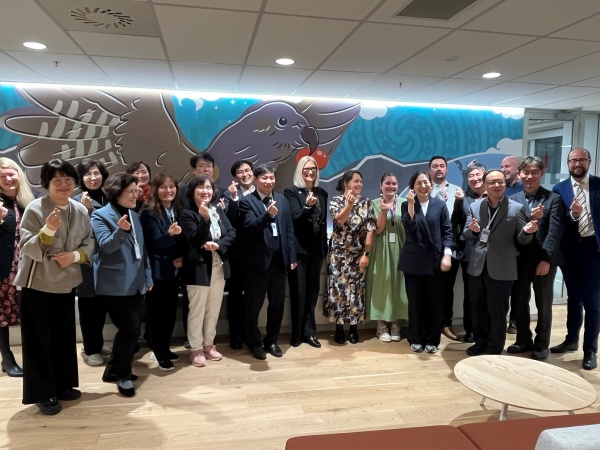
The delegation was formally welcomed to the Wellington with a Mihi Whakatau hosted by ENZ Chief Executive Amanda Malu, local staff and the Ministry of Education (MOE).
In Wellington, the delegation received a detailed briefing from the Ministry of Education and visited Scots College to observe the school in action.
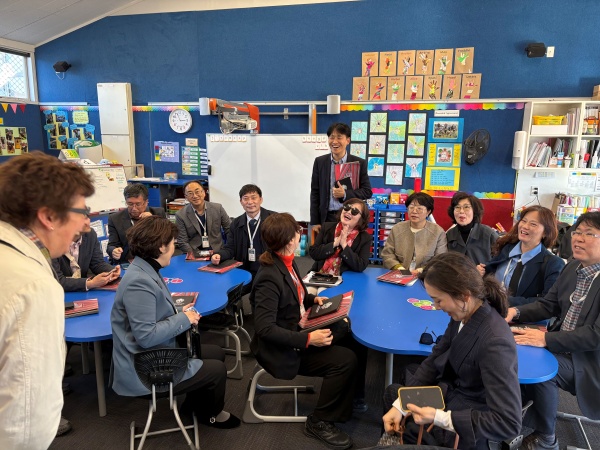
Scots College Junior School Principal, Rachael Huggins, showing the Incheon delegation around a primary-level classroom.
Down to Christchurch, the Incheon delegation visited Lincoln University to fine-tune the details of an MoU signed in January this year. The partnership arrangement will support five Incheon students to study at Lincoln University each year.
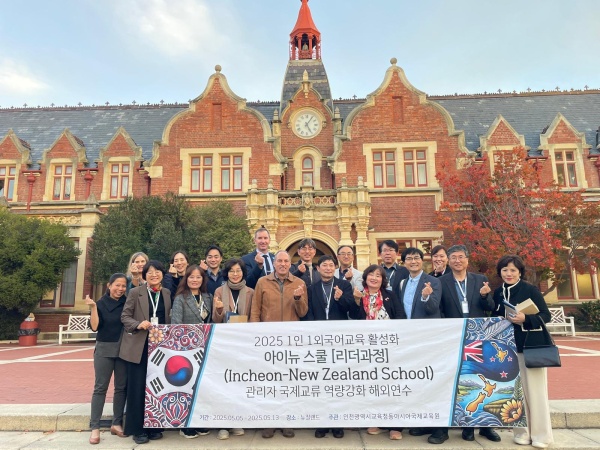
Incheon delegate members with Lincoln University staff from the Faculty of Agriculture and Life Sciences, Faculty of Agribusiness and Commerce, Academic Preparation and Pathways and International Operations.

Waitākiri Primary School Principal Mr. Andrew Barker introduces a Year 6 long-term international student from Korea to the delegates. She shared how much she has enjoyed her time at Waitākiri Primary School and expressed her sadness that her year at the school is coming to an end.
The group visited Shirley Boy’s High School and Avonside Girls High School in Christchurch, with a side-visit organised with Waitākiri Primary School.
Further South, a visit was arranged with Otago Polytechnic in Cromwell to understand the pathways to vocational education in New Zealand.
Director of Incheon Metropolitan Office of Education East Asia Global Education Institute, Jooyong Kim, said visiting New Zealand schools was a truly meaningful and deepened delegates understanding of the education system.
“We hope this visit will help strengthen the relationship between schools in New Zealand and Incheon”.
“We look forward to future collaborative projects with New Zealand institutions,” he added.
Several of the schools visited have expressed interest in deepening these new relationships, with planning underway to keep up the momentum and connect again at ENZ-led fairs and agent seminars in Korea later this year.
-
New Zealand strengthens its position as a study abroad destination for Brazilians
Figures from the 10th annual Brazilian Educational and Language Travel Association (Belta) Seal Survey 2025 show that New Zealand has climbed to the sixth most chosen destination by Brazilians studying abroad – compared to seventh place in 2024.
The survey ran from February to April this year and brought together insights from 586 education agencies and 1,780 students from across Brazil to understand trends, behaviours, and preferences in the international education sector.
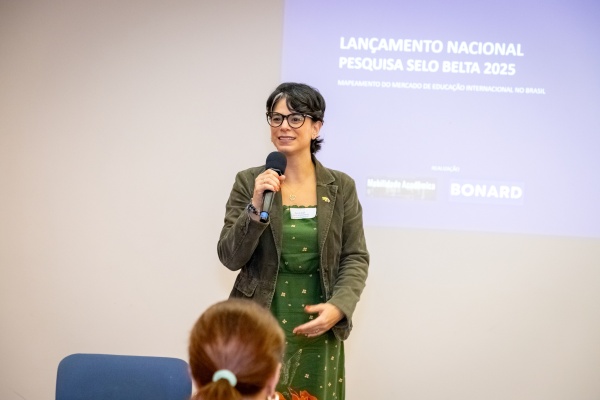
At the survey launch in May, ENZ Market Development Manager, Bruna de Natale, discussed the country’s growing relevance as a study destination for Brazilian students.
Speaking at the survey launch event in May, ENZ Market Development Manager, Bruna de Natale said "The data shows that New Zealand has not only maintained its appeal but has also strengthened its position on the radar of Brazilian students, especially amid uncertainties in other markets."
Dive into the data
Language courses remain the most sought-after programs, accounting for 91% of preferences among the agencies surveyed.
Why Brazilian students are choosing New Zealand
According to the data, the main factors driving the choice of New Zealand as a destination are:
-
High quality of life and safety
-
Academic excellence with a focus on innovation
-
Ease of obtaining a student visa
-
Permission to work while studying
-
Economically and socially stable environment
In addition, the growing demand for enriching cultural experiences, closer contact with nature, and the opportunity to develop socio-emotional skills has placed New Zealand in the spotlight — particularly among students who value a comprehensive education.
Additional insights from New Zealand-focused questions
A complementary survey, also conducted between February and April 2025 with 586 education agencies and 1,780 students across Brazil, highlighted specific factors influencing the decision to study in New Zealand.
The survey revealed that 75% of respondents who showed interest in New Zealand also considered it one of their top study destinations — ahead of countries like the United Kingdom and Canada. Students associate New Zealand with high-quality education, a good international reputation for its institutions, and globally recognised qualifications.
Additionally, New Zealand stands out for offering work opportunities during and after studies, socio-emotional skill development, and access to nature and outdoor activities — these factors align with current student preferences for holistic and life-enriching study abroad experiences.
If Brazil and/or any other Latin American country is part of your business plan for the 2025/26 financial year, please contact the in-market team via Latinamerica@enz.govt.nz.
-
-
PM mission advances New Zealand and China education relationship
The New Zealand Education Connect event on 20 June at the New Zealand Embassy in Beijing brought together leading Chinese government representatives, institutional partners, education agents, and alumni to strengthen people-to-people links and celebrate collaboration.
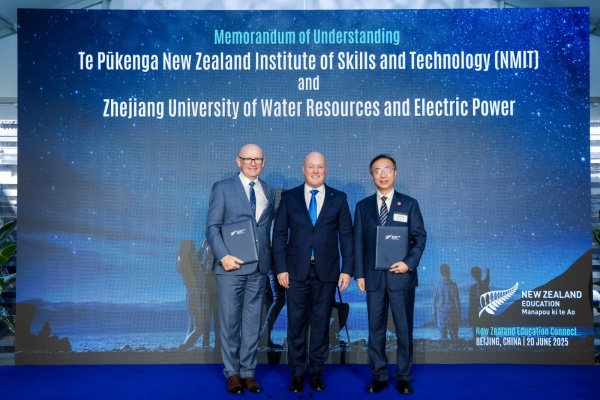
The event programme was packed, with nine Memorandums of Understanding (MoUs) signed between New Zealand and Chinese counterparts, and another MoU signed between Victoria University of Wellington and Fudan University on 19 June.
Providers from across the tertiary education sector signed the MoUs – with Victoria University of Wellington, Unitec, NMIT and UP Education’s University of Auckland International College and New Zealand Tertiary College formalising partnerships.
These agreements cover a mix of in-market delivery, joint programmes, and initiatives to grow student mobility between New Zealand and China.
This builds on the now over 60 approved joint education programmes and institutes recognised by the China Ministry of Education between New Zealand and Chinese institutions, and other education partnerships across early childhood education, vocational training, higher education, and research areas.
The New Zealand Education Connect event had senior leaders officially launching New Zealand’s Country of Honour campaign for the upcoming China Annual Conference and Expo for International Education (CACIE), China's largest platform for international education, due to take place in October this year.
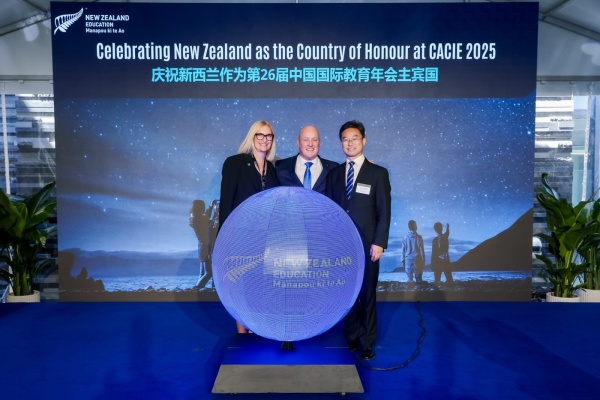
ENZ’s Chief Executive, Amanda Malu, launches the Country of Honour campaign for New Zealand at CACIE alongside Prime Minister Luxon and CEAIE’s Secretary General Jun Yang.
ENZ Chief Executive, Amanda Malu, said it’s exciting to see advancement of the partnerships New Zealand providers have built with their Chinese counterparts.
“We’re eager to see the outcomes of the new agreements formalised at New Zealand Education Connect and look forward to deepening our bilateral ties by leading a delegation to CACIE later this year,” she said.
Information on the registration process for New Zealand education providers to join the New Zealand Country of Honour events in October will be shared next month on ENZ’s event page.
The Country of Honour promotional video is available with Chinese subtitles on The Brand Lab.
-
Driving student interest in Indonesia through strategic co-funded initiatives
ENZ and SUN Education delivered a jam-packed programme of student recruitment events in Surabaya and Jakarta in late May to drive student interest and connect New Zealand providers with potential partners for academic collaboration.
Surabaya
The activity began with an introductory meeting between Universitas Airlangga’s International Office and visiting New Zealand providers to explore opportunities for academic collaboration between our two countries.
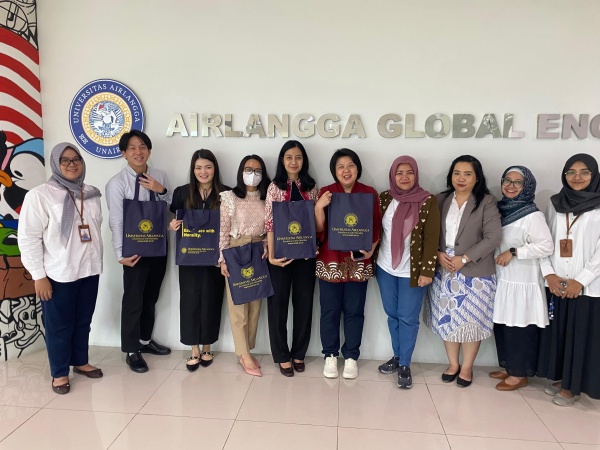
The meeting was attended by representatives from the University of Auckland, Auckland University of Technology, the New Zealand Honorary Consulate in Surabaya and SUN Education.
Discussions centred on potential areas of partnership, including articulation pathways, staff exchanges, guest lectures, and joint research initiatives.
The following day, providers met with prospective students at the Study in New Zealand Exhibition in Surabaya.
The exhibition featured the University of Auckland, Auckland University of Technology, University of Waikato, UP Education, University of Otago, Le Cordon Bleu, the Southern Institute of Technology and Lincoln University.
The event attracted around 200 students and their parents.
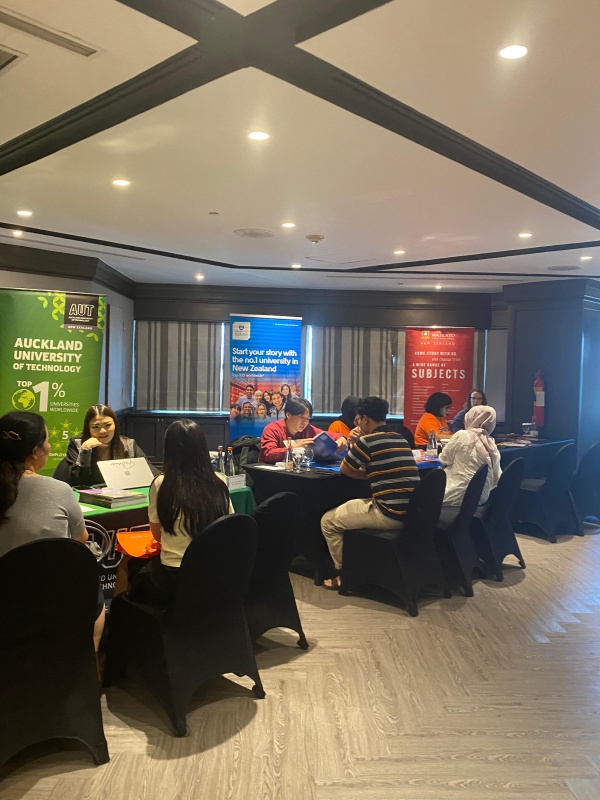
Study in New Zealand exhibition attendees learning about tertiary education options in New Zealand.
Jakarta
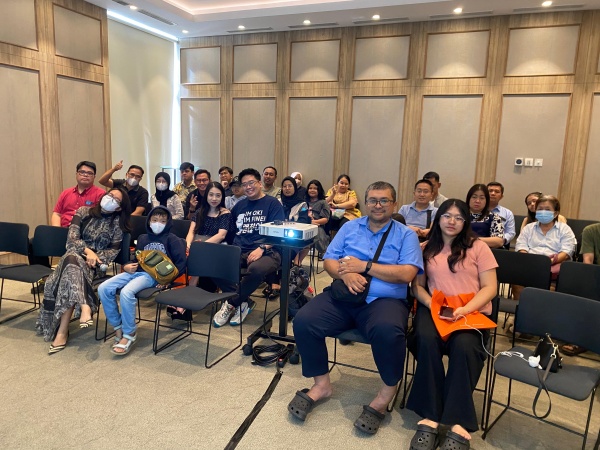
Over to Jakarta, ENZ organised an exhibition featuring a strong line-up of New Zealand institutions, comprised of all eight of New Zealand’s universities alongside the Southern Institute of Technology, Le Cordon Bleu, University of Canterbury International College and UP Education.
The fair attracted approximately 250 students and parents, all eager to explore the diverse study options and world-class education opportunities that New Zealand has to offer.
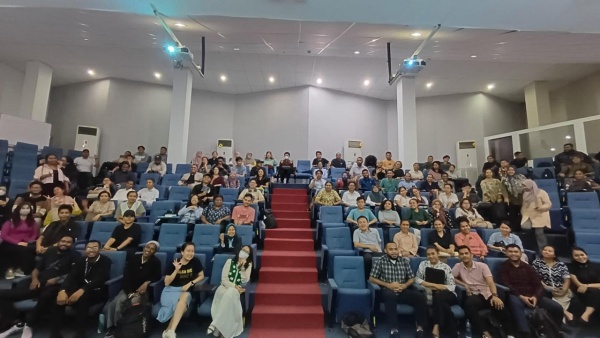
To close off a busy student recruitment period, a mini exhibition was hosted at Universitas Indonesia, the top-ranked university in Indonesia.
The exhibition was specifically for LPDP Affirmative Scholars and students interested in postgraduate-level study.
As part of the event, ENZ Market Manager, Naluri Bella, delivered a ‘Study in New Zealand’ session, which attracted around 100 enthusiastic attendees.
The session provided insights into New Zealand’s high-quality education system and scholarship opportunities, helping to raise awareness and inspire future postgraduate study pathways.
ENZ’s Regional Director (Asia) Ben Burrowes said the activities were designed enhance agents’ and students' awareness of New Zealand’s world-class education offering.
“These collaborations help position New Zealand as a competitive and credible choice for Indonesian students,” he added.
-
New Zealand’s EdTech at centre-stage of International Education
Export digital products and services have long been an important element of New Zealand’s international education sector, but they have largely flown under the public radar. Overnight, the needs of learners changed, and education providers found themselves in uncharted territory.
New Zealand companies with an established reputation delivering digital educational programmes quickly stepped up both the range and reach of their products. This, combined with Aotearoa’s reputation for creativity and innovation, and more than a little manaakitanga, has resulted in the phenomenal growth of some of our best-known EdTech brands over the past year.
Kami is helping Schools Globally
At digital online learning platform Kami, the goal is success for every student, regardless of ability, by providing inclusive and intuitive tools that support any learning style. They include text-to-speech, voice-typing, freehand drawing, and audio and video commenting.
Many of the schools which closed globally adopted Kami’s digital classroom technology. The company has grown from 8 million to 27 million users in 180 countries over the past year, adding one million new users in one week alone.
Code Avengers taps into the popularity of Gaming
Code Avengers takes a left-field approach to engaging learners by tapping into the popularity of gaming and uses those concepts to captivate students and build their digital capability. The platform was only founded in 2012 and is now being used in 15,000 schools in 14 countries.
“Our goal is to prepare teachers and students, from all backgrounds, for the current reality of the job market, and the jobs of tomorrow,” says Code Avengers CEO Hamish Day.
“We want to help give people confidence and an opportunity to learn the skills that industry tells us it needs.”Education Perfect are inspiring the next Generation of Changemakers
EdTech providers also have the power to engage students on social issues and challenge them to think critically. Key market player Education Perfect, which reaches more than one million students in 1800 schools globally, is finding new ways to inspire the next generation of changemakers.
It is building curriculum content to include issues such as social justice, sustainability, student health and wellbeing, and indigenous issues. It recently partnered with Australian animal rights organisation Voiceless to deliver modules focused on animal welfare, including the issues of dolphins living in captivity and the export of live animals.
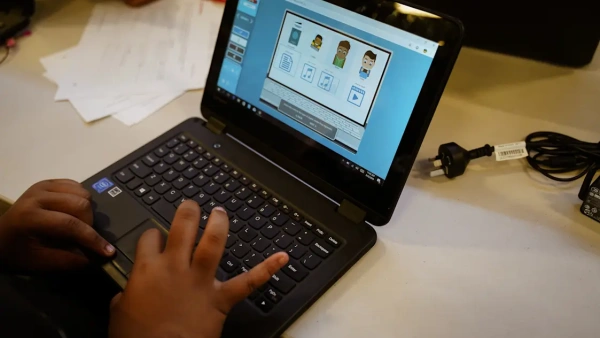
EP Partnerships Director Anna Redmile says that joining forces with Voiceless allows teachers and students to have conversations which promote critical thinking and better understanding of the world they live in.
Education consultant and Voiceless adviser Dr Christina Jarvis agrees. "As we help children embrace an increasingly complicated future, such skills are paramount for developing engaged citizens.”
EdTech will continue to play a key role in New Zealand’s International Education Offering
The EdTech sector was estimated to contribute $300 million to the New Zealand economy in 2017, and those figures will have ballooned with the impact of Covid.
Looking to the future, educational technology will play an increasingly key role in the diversification of New Zealand’s international education offerings. And there is no shortage of amazing and pioneering companies ready to play their part.
-
Pakistani student leverages language skills to connect communities
Fluent in Punjabi, Urdu, and English, and passionate about community service, Usma soon became a key player working to support and connect ethnic communities in Christchurch.
So extensive have her achievements been, that she has been honoured by the university with a coveted Blues Award for community engagement, and by the Christchurch City Council with a Civic Award.
Usma arrived in New Zealand in late 2016 and gave birth to her third child shortly after arriving. “It gave me the time I needed to assess society here, and I realised the value that was placed on volunteer work.”
New Zealand values transferable skills
“My background was in teaching and ESOL (English for Speakers of Other Languages) instruction. I did teach here when I first arrived, but it was not fulfilling enough,” she says. “I needed to think what other skills I had to offer in an area of work I was passionate about. New Zealand is not a destination of degrees, it is a destination of skills, where whatever transferable skills you have to offer, are valued.”
She initially got involved in UC’s Pakistani Student Association, planning events which quickly extended beyond the student community. “I got great feedback from the wider community and different ethnic groups started coming along. People from these communities were looking for connectivity and involvement and it ended up being a multi-cultural hub.”
She admits it was not without challenges, but she was determined. “I was an international student, a woman, a mother of a special needs child, and I was working. But I managed my time. I enjoy doing volunteer work and it comes naturally.”
In her second year at Uni, she secured a role as a Diversity and Engagement Officer with the Ministry of Ethnic Communities and juggled both study and work. It was in this role that she became involved in the Government response following the Christchurch mosque attack in 2019.
Frontline worker following mosque attack
“I was one of the frontline workers dealing with victims and those left behind. Some of my colleagues were victims,” she says. “It was a difficult time. I had never had any exposure to such an event, or what the aftermath might be like. Hearing the stories, and being part of it, are totally different things.”
“I’m very proud of my work and found it very rewarding. I discovered my strengths and weaknesses and learned how much I had to offer. I could speak with many of the widows in the Muslim community in their own language, understand their needs, and advocate on their behalf. I learned how to deliver the key messages to the government agencies involved in the response and formed a link between the two groups.”
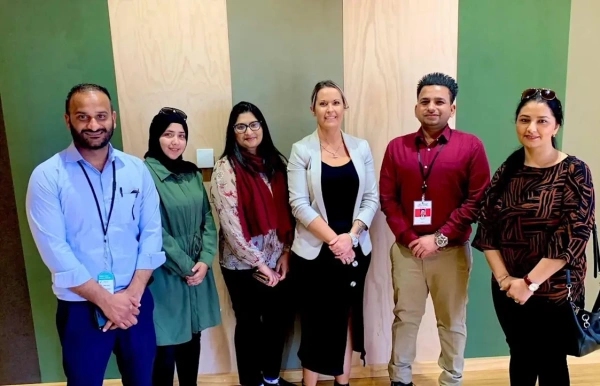
“The migrant communities have so much resilience and I believe that every disaster brings opportunity to come together, to heal, and to grow.”
Usma went on to become involved in Widows of Shuhada – an eight-part Plains FM/RNZ podcast documentary series which followed the journey of four widows following the attack.
Soon after, Covid-19 arrived in New Zealand and Usma worked on engagement with local ethnic communities, translating the Government’s messages and communicating them through a range of digital channels.
Tapping into the skills of international students
But she didn’t stop there. Usma was also influential in Christchurch’s Ethnic Communities Skills Build Programme, a project designed to smooth the pathway of migrants and international students into employment in New Zealand.
International students could join in workshops, meet career counsellors and job brokers from the Ministry of Social Development, reshape their CVs, and attend job fairs.
“I believe we need to tap into the high-level skills of post-graduate international students. We need to progress them in the right direction, utilising their skills in science, technology, and innovation.”
As for her own career, Usma could not be happier. She has secured a full-time role as a policy analyst at the Ministry of Primary Industries in Wellington and has taken a step back from her volunteer work to focus on completing her PhD this year.
She is grateful for the opportunity to study in New Zealand and to bring her family with her. Her husband is working, her children are happy, and her special needs daughter has opportunities she wouldn’t have had in Pakistan.
Usma still acts as a mentor for international students and tells them if they are to make the most of their time in New Zealand, they should “think outside the box”.
“They should think about the skills they have to offer in the community, and they will be rewarded with a transformative experience. Leaving behind the social constraints of your home country can be liberating. It’s all about following your dream.”
Usma says she’s already landed her dream job, but she plans to continue her community work once she has completed her PhD.“I believe it is my contribution to this country and I love doing it. I’m not likely to stop. I’m just settling in, finishing my PhD, and getting ready for something big. I have ambitious plans.”
-
Patrick Au: a champion for international students in New Zealand
Disclaimer: This story was originally published on New Look, which was also operated by Education New Zealand Manapou ki te Ao. It has been republished here to ensure wider access and visibility.
He has spent more than two decades working with international students and Asian migrants in primary and tertiary healthcare settings, understanding their mental health needs and advocating on their behalf.
Patrick is a registered psychiatric nurse and counsellor who migrated from Hong Kong in 1991, completed his Master’s in Education in 1999, and has worked tirelessly to support Asian communities in New Zealand. He is now stepping down from his role as Asian Mental Health Coordinator for the Auckland District Health Board to commit more time to private practice.
It was Patrick’s emerging reputation for specialty expertise which led to the International Education Association ISANA asking him in 2010 to prepare a presentation to international education providers about the mental health needs of international students. This was quickly followed by a contract with the Ministry of Education to present a series of workshops nationally.
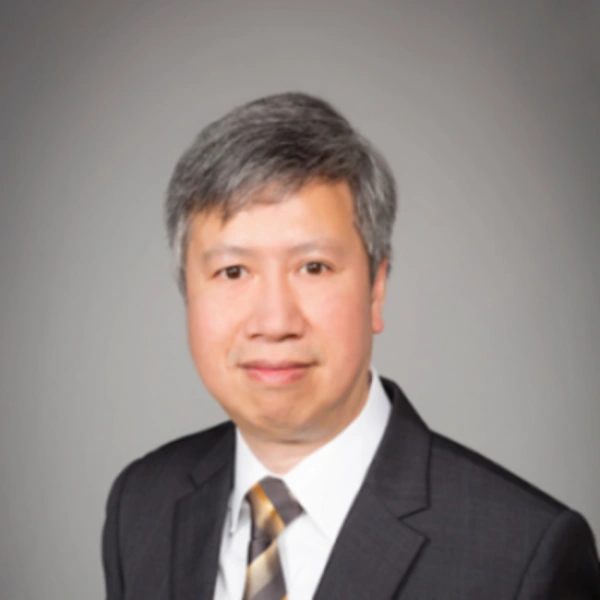
“I was overwhelmed by people calling me and asking me for advice,” Patrick says. “This is where I seriously started my work with international students.”
In more recent years, Patrick has been a key player in the Auckland Agencies Group, which brings together multiple organisations with the common goal of enhancing student wellbeing.
The issues which international students can face vary, depending on their age and stage of education. For younger school students it can be homesickness and lack of parental guidance. Older students also face settlement issues but can have the added pressure to succeed.
“People come here to study and so they need to be successful,” he says. “From an Asian perspective, we are a collectivist society. Your success is not just for yourself, the grades and glory are for your family too. If you are successful at your study you are acknowledged as a successful person, but what if you’re not able to finish your study? The pressure is on you.”
Prevention and awareness key to mental wellbeing
Patrick is a great believer in the importance of awareness and prevention when it comes to mental wellbeing and says New Zealand has made good progress with the availability of resources which students can access on campus, through workshops, and online. Support services are widely established, and the International Students Wellbeing Strategy ensures government agencies work together to support international students to feel safe, well, and welcome in New Zealand.
“Most Asian cultures believe the body and mind are not separated. So we need to address the root cause of problems in behaviourial terms - how to adapt to the new environment, how to get better sleep, how to cope with exam pressure, how to eat well, rather than talking about mental health. When they hear these two words they will withdraw from you,” he says.
“There is very limited mental health education in the students’ home countries, but with all the online resources available here students are researching the issues. There is much wider awareness, and sometimes it is friends who recognise issues and offer peer support in seeking help.”
Patrick knows that some students come up against cultural intolerance and misunderstanding but says that New Zealanders have come a long way since the early days of the international education sector in understanding the challenges which international students can face, but also the contribution they make to society here.
International students talented and motivated to contribute
“International students bring cultural diversity and increase cultural awareness among New Zealanders,” Patrick says. “The students who come here are quite talented and motivated to contribute. Once they have completed their education, they can contribute in many ways."
“International students bring cultural diversity and increase cultural awareness among New Zealanders” – Patrick Au, mental health expert and international student advocate
International students can be the bridge between their home country and New Zealand. If you want to do business in these countries, international students can play an important role as they often act as informal ambassadors for New Zealand and can open doors to business.
New Zealanders are also contributing to their success by creating a nurturing environment for them to complete their studies. Over the years we have seen lots of successful international students who have started working and contributing to the New Zealand economy after completing their education.
“If they have a positive experience, they are also instrumental in encouraging other students from their home country to come to New Zealand. I think it is a win-win situation.”

